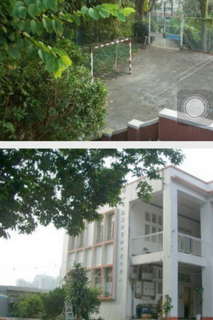Green Education
 An interview with RTC GAIA School principal Mr Yip Chung-Sing
An interview with RTC GAIA School principal Mr Yip Chung-Sing
RTC Gaia School (Gaia School) is Hong Kong's only "green" primary school. In addition topromoting outdoor learning in a natural setting and green living, Gaia School itself is an advocate of child-centred and individualised teaching strategies. The ultimate goal is to arouse students' curiosity and enhance their self-study attitude. Some parents of the school's students have a strong wish to raise their children's awareness of environmental consciousness. Some others simply want to engage their kids in a learning environment that is open-minded and creative by nature. Some of them sent their children to Gaia School because they had beenfound unable to adapt to the heavy homework workload and stress of exams of mainstream schools. As such, Gaia School, where lessons are taught in a more fun and relaxed way, has become their priority.
According to Principal Yip, Gaia School holds the class based on the following three objectives:
(1) Learning from the nature. Gaia School is secluded in the leafy suburb of Tuen Mun, surrounded by lush greenery and trees. Students coming to school day in and day out can get close to the nature and come in close contact with trees and insects. The school never turns on air-conditioning, andall furniture is second hand. The school teaches the children to develop food attitudes and dietary practices and teaches them about planting and fertilising at school. Studentsare further taught how to do disheswith eco-friendly dishwasher soapand are requested to bring school some items that could be recycled. They are encouraged to barter items that they do not need with each other. The school organises fun outdoor activities for the students every month, such as hiking, swimming and camping, so that they can learn more about the nature while learning to be independent and try to do lots of things without help.
and trees. Students coming to school day in and day out can get close to the nature and come in close contact with trees and insects. The school never turns on air-conditioning, andall furniture is second hand. The school teaches the children to develop food attitudes and dietary practices and teaches them about planting and fertilising at school. Studentsare further taught how to do disheswith eco-friendly dishwasher soapand are requested to bring school some items that could be recycled. They are encouraged to barter items that they do not need with each other. The school organises fun outdoor activities for the students every month, such as hiking, swimming and camping, so that they can learn more about the nature while learning to be independent and try to do lots of things without help.
(2) Gaia believes each child has different characteristics; therefore, their learning abilities and interests diverge. Since the school implements small group teaching, forming classes of 15 pupils, it would make adjustments to the class curriculum, depending on different pupils’ standard. Moreover, pupils can opt for those sports they would like to learn in physical education lessons; they can pick either drawing or music in visual arts classes. In this school, dictation does not grab away marks from pupils. Instead of deducting marks, the teachers sometimes give extra marks, in the hope that pupils are not scared of diction which they think it can leave them with a big zero.
(3) Learing Motives - Yip think each child has their own learning motives; today mainstream schools make children lose their enthusiasm for learning, by excessively tedious curriculum which reflects no reality, and rote learning of vocabularies not frequently used in everyday situations. But Gaia encourages pupils to learn from life – searching for suitable learning materials in the communities and developing the materials themselves. On top of this, the school has a “free time” subject, where pupils can choose either not to do anything, or to learn other topics. The majority of the pupils choose to learn their interested subjects. Yip considers free time to be able to ignite pupils’ zeal for knowledge.
Besides, the sheer amount of homework simultaneously overwhelms struggling kids and their parents. By contrast, Gaia School encourages its students to learn from everyday life. Lesson plans not only incorporate suitable teaching materials from a range of sources, but also include proprietary learning materials developed by the teachers. There is also a free class during which students can choose to do nothing at all, or learn anything else they are interested in. Despite the temptation of being allowed to do nothing, however,the majority of students choose to study the subjects they are most interested in. Given enough free time, Principal Yip believes that students' intrinsic motivation to learn can be stimulated some way.
Thanks to the implementation of "small-class teaching", the learning curve of students accelerates notably shortly after they have been enrolled in the school, says Principal Yip. . On account of these homecoming activities, Gaia pupils exhibit more mature emotion quotient (EQ) performances. Their better EQ serves as an academic booster in secondary school, where they can perform better than the average.
YMCA Christian Academy (YCA) is a unique, community-oriented private primary school situated in the heart of Hong Kong Island. It offers a broad and balanced international curriculum rooted
Read MoreSingapore’s most forward looking primary school intends to open the doors of its first kindergarten and primary school in Greater China, offering an English and Mandarin immersion programm
Read MoreSchool tours are vital during the admissions process for a child as the tours allow the parents to meet the people responsible for educating their children, observe the school’s facilities, exam
Read MoreStamford American School Hong Kong (Stamford) is a through-train school for students ages 5 to 18 where graduates can receive both an American and IB Diploma* which allows them access to top universit
Read MoreLearning a new language can always be quite intimidating and challenging in the beginning. However, it can prove to be immensely useful in the future. We provide students the opportunity to become
Read MoreWould you like to know more about your child’s English level and other abilities, whether they are from kindergarten to secondary? There is no easy task, however, our experienced cons
Read More





